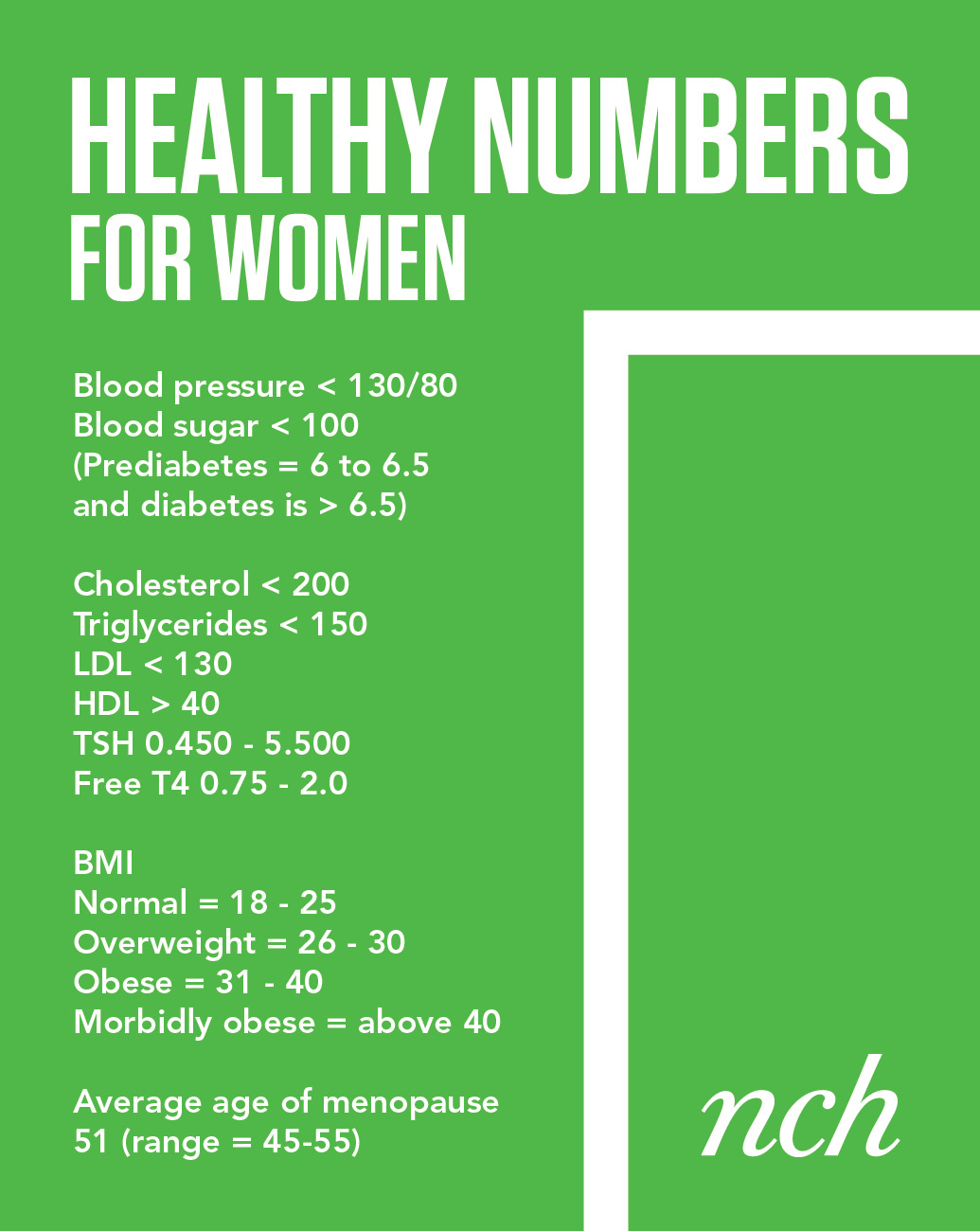Know your numbers series – women
July 19, 2019

Visiting your primary care physician? Our three-part series explores various patients – men, women and children – and the numbers that are considered healthy during routine screenings. If you missed our first installment, see Part I – Men with NCH Medical Group Family Medicine Physician Arthur Hong, M.D.
Part II – Women
Simran Jit, M.D., NCH Medical Group Family Medicine Physician, discusses what numbers women should know and why.
Blood pressure
Blood pressure refers to the pressure blood applies to the inner walls of the arteries. Blood pressure is reported as systolic over diastolic pressure. Normal blood pressure is less than 130/80. Untreated high blood pressure increases strain on the heart and arteries, eventually causing organ damage. High blood pressure increases the risk of heart failure, heart attack, stroke and kidney failure.
It is very important to get your blood pressure checked with your doctor at least once every year if it is in normal range, and more frequently if it is above 130/80.

Treatment of blood pressure begins with lifestyle changes such as reducing the amount of salt in your diet, losing weight, quitting smoking and exercising for at least 30 minutes daily.
Blood sugar

Normal fasting blood sugar levels should be less than 100. Another test called A1C reads the average blood sugar for three months. Patients are diagnosed with diabetes if their A1C is 6.5 or more. A diagnosis of prediabetes is given when the A1C level is 6-6.5.
Type 2 diabetes is a disorder that disrupts the way your body uses sugar. Diabetes usually does not produce symptoms, but intense thirst, needing to urinate often and blurry vision are a few common indicators.
It is very important for women to get a physical and labs every year to make sure blood sugar levels are in a good range. Medicines are not the only tool to manage diabetes. Staying active, losing weight, eating right and not smoking can all help women with diabetes stay as healthy as possible.
Cholesterol
A high cholesterol level can significantly increase your risk of developing chest pain, heart attack and stroke. Cholesterol levels can be lowered with a combination of diet, weight loss, exercise and medications. As your level decreases, so does your risk for developing cardiovascular diseases, including diseases of the blood vessels supplying to the heart, brain and limbs.
Total cholesterol for women should be less than 200, triglycerides should be less than 150 and LDL (bad cholesterol) should be less than 130. HDL is good cholesterol which we would like to be above 40.
If you have high LDL cholesterol, you should try to reduce the amount of total and saturated fat in your diet, lose weight, get regular aerobic exercises and eat plenty of fruits and vegetables.

Weight
BMI is the most practical way for women to evaluate their degree of obesity. BMI is calculated using this formula: Weight in pounds by height in inches squared and multiplied by a conversion factor of 703. A BMI of 18-25 is considered normal; 26 – 30 is considered overweight; 31 to 40 is considered obese; and above 40 is considered morbidly obese.
Obesity is a global health epidemic. It’s a risk factor for the development of multiple medical conditions including heart disease, stroke, high blood pressure, diabetes, heart failure and high cholesterol.
Menopause
Menopause is the time in a woman’s life when she stops having monthly menstrual periods. At this time, ovaries stop releasing eggs and stop making estrogen and progesterone hormones. Menopause usually occurs between the ages of 45 and 55. The number to know for the average age of menopause is 51. Usually periods get irregular, come more or less often, and with bleeding that can vary in flow and length of days.
Some women go through menopause without any symptoms. Most will experience hot flashes, night sweats, sleep problems, vaginal dryness and depression. There is a test that can point to menopause, but doctors usually use that test only in women who are too young to be in menopause or who have special circumstances. There are treatments available that can help relieve menopausal symptoms, such as hormone replacement therapy, antidepressants and other medications.
Thyroid
Thyroid hormones are secreted by the thyroid gland which controls the metabolism of your body. Women should get their thyroid hormones checked annually.
TSH normal range is 0.450- 5.500uIU/ml
Free T4 normal range is 0.75-2.00ng/dL
If numbers are high or low, medication can help to normalize levels.
Dr. Jit’s clinical interests include women’s health, diabetes and hypertension. She is accepting new patients at two locations. Call 847-221-8700 to schedule an appointment at 500 N. Hicks Road in Palatine, or 847-550-4700 to schedule an appointment at 1217 S. Rand Road in Lake Zurich. She will begin seeing patients at the new NCH Medical Group location in Kildeer beginning in early 2020.